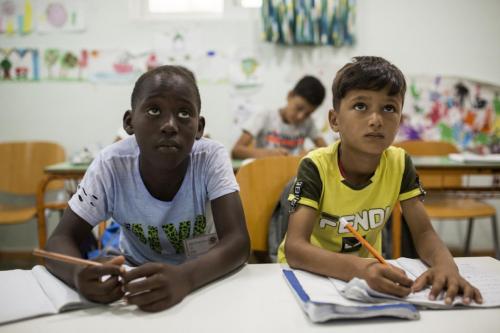UNHCR, UNICEF and IOM urge European states to boost education for refugee and migrant children
Key challenges include lack of school spaces, teachers not adequately trained, language barriers and limited access to psychosocial support
Three UN agencies are calling on European States to increase resources and practical support for their school systems to ensure all refugee, asylum-seeking and migrant children can access and stay in quality education.

Children living at the Pyli Reception and Identification Centre learn Greek at the KEDU non-formal education centre on the island of Kos, Greece.
In a briefing paper published, on September 11, UNHCR, the UN Refugee Agency, UNICEF, the United Nations Children’s Fund, and IOM, the International Organization for Migration, detail the obstacles children and adolescents born outside Europe face when trying to access education in Europe.
Currently the number of children and adolescents born outside Europe (including recently arrived refugee and migrant children) who leave school early is nearly twice as high compared to native-born children. Migrant children also have lower learning outcomes when they are not given adequate support. For example, around 3 in 4 native-born students attain proficiency in science, reading and math but only 3 in 5 students with a migrant background do.
Among the key challenges highlighted in the report are:
● Insufficient financial resources
● Not enough school spaces or teachers trained to work with refugee and migrant children
● Language barriers
● A lack of psychosocial support and limited catch-up classes. The latter are vital for children who have missed extended periods of schooling or have come from different education systems.
Children of pre-primary age (3 to 5 years old) and upper secondary age (15 years and older) are particularly vulnerable to being out of school, as they are often beyond the scope of national legislation on compulsory education.
To help States tackle these challenges and address key data gaps, the paper gives examples of good and promising practices in education across Europe and makes a series of recommendations.
“For refugee children, education is not only vital for their own futures but for the communities in which they live. Quality education boosts life chances, facilitates integration, and is a win-win for the student and society. Investing in education for all is one of the best investments a government can make,” said Pascale Moreau, UNHCR Director of the Bureau for Europe.
The brief urges States to strengthen the links between schools and other critical public services, such as health and child protection to ensure that barriers to enrolment and factors contributing to early leaving are addressed. The paper also recommends increasing access to early childhood education services and promoting the integration of young people into upper secondary education and training programmes.
“With political will and additional investments, Governments across Europe can build inclusive public-school systems, ensuring all children, regardless of their migration status have their right to an education protected, while building inclusive and successful communities,” said Ms. Afshan Khan, UNICEF Regional Director for Europe and Central Asia and Special Coordinator for the Refugee and Migrant Response in Europe.
The three agencies also call on States to increase efforts and make further investments at both national and regional level to collect quality standardized and harmonized data on refugee, asylum-seeking and migrant children in education, to inform policy development and allocation of resources.
“Eliminating gaps in refugee and migrant children’s education is critical to their development and well-being and this can have a positive knock-on effect for society in general. Education also has the cohesive power to help refugee and migrant children and their families build links to the local communities and to contribute. Investing in inclusive and quality education will help us to meet our responsibility to ensure that no generation is left behind,” said Manfred Profazi, IOM Senior Regional Adviser for Europe and Central Asia.
Source: United Nations High Commissioner for Refugees
- 564 reads
Human Rights
Fostering a More Humane World: The 28th Eurasian Economic Summi

Conscience, Hope, and Action: Keys to Global Peace and Sustainability

Ringing FOWPAL’s Peace Bell for the World:Nobel Peace Prize Laureates’ Visions and Actions

Protecting the World’s Cultural Diversity for a Sustainable Future

Puppet Show I International Friendship Day 2020

